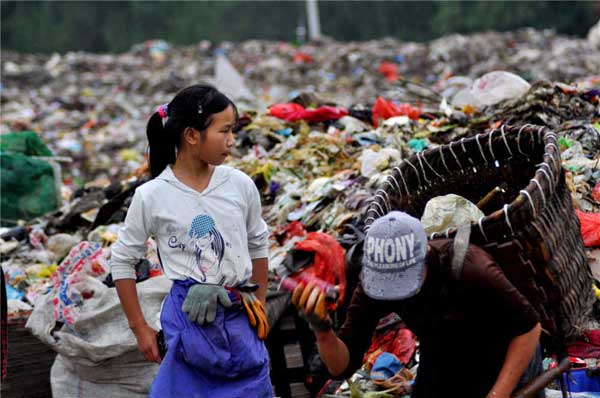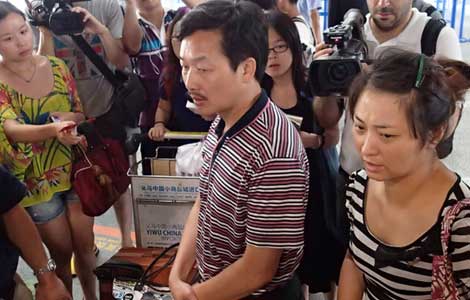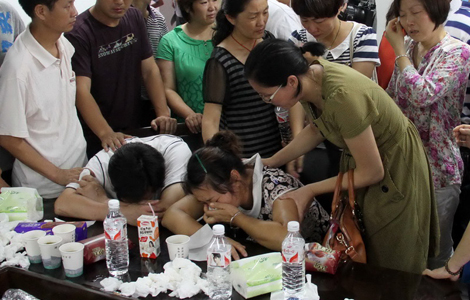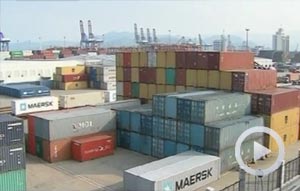Subsidies aid poor families
Updated: 2013-07-09 02:04
By He Dan (China Daily)
|
||||||||
Wang Huini says she felt her world fell apart when her 10-year-old daughter was diagnosed with kidney disease last year.
According to doctors, it was going to cost 60,000 yuan ($9,770) to save the girl, yet the family's entire savings amounted to just a third of that.
 |
|
A girl works with her family at a dump in Guiyang, the capital of Guizhou province. Lin Jian / for China Daily |
"We don't have land, and my husband, the only breadwinner, earns less than 3,000 yuan a month," said the 33-year-old, who also has a younger daughter. "I felt so sad and hopeless."
With few options, she turned to her village child welfare officer, who in turn contacted her superiors in Luoning county, Henan province.
It resulted in the family receiving 4,000 yuan toward medical bills and a 150 yuan monthly living allowance. Coupled with money loaned from friends and relatives, Wang's daughter received an operation in April last year.
"She has now recovered and is doing great at school," said Li Maiyun, her welfare officer, adding that the village has many poor families in the same plight.
"There are two children with cerebral palsy, one with congenital heart disease and one who is deaf."
Fifteen children in the village now receive the monthly allowance, and there are many more throughout Luoning county, which has been piloting its child welfare intervention system since 2011. In fact, the early success of the model could provide vital experience for the Ministry of Civil Affairs, which has committed to creating a comprehensive national system.
The ministry said in late June that, along with Luoning county, it has designated the cities of Kunshan in Jiangsu province, Haining in Zhejiang province and Shenzhen in Guangdong province as "experimental zones" to explore feasible models to deliver sound child welfare services.
Noticeably, Luoning is the only poverty-stricken area, while the others are in more developed coastal regions.
Xu Jianzhong, deputy director of the ministry's department of social welfare and charity promotion, said authorities aim to eventually be able to provide living subsidies for millions of children in plight, including the homeless, disabled and seriously ill.
Youngsters in plight belong to a major target group in the plan to establish a nationwide system, he said.
"Although there are no official statistics to show the exact number of children in plight, we estimate this group is in the millions," he said. "Providing subsidies and improving services is important for their survival and development."
Improving child protection hit the headlines in China after media stories about children left in danger or hazardous situations because their birth parents failed to take care of them.
In Nanjing, capital of Jiangsu province, two girls were found starved to death on June 21 after being locked and abandoned in an apartment by their mother, a suspected drug addict.
The story of a mentally ill mother living on the streets with two severely malnourished children also spread online in late June.
A netizen published images of a woman sitting outside a public toilet with two children in Zhengzhou, capital of Henan province, and called for help online on May 28. Police sent the mother to a mental health clinic for treatment, and the children were sent to a maternal grandmother in a village in Pingdingshan two days later.
Zheng Junhua, the children's aunt, told China Daily the youngest girl, aged 6 months, weighed just 2.7 kg. Authorities have pledged to have a plan for the family once the mother is discharged from hospital, she said on Monday.
Before establishing a national child welfare system, the four experimental zones were selected because their governments showed enthusiasm and had preliminary experience, said Zou Mingming, deputy director of the Ministry of Civil Affairs' child welfare division.
The Luoning model is seen as the most mature. Du Liming, deputy director of the county's civil affairs, said his bureau provides financial support for disadvantaged children, although the subsidy varies according to the situation.
For example, a monthly subsidy of 1,000 yuan is given for institutionalized orphans, 600 yuan for parentless children with foster families and children infected with HIV/AIDS, 150 yuan for children from rural impoverished families, and 243 yuan for those in urban areas.
To date, 1,100 of 5,800 children in plight receive monthly subsidies from the county, Du said.
All 388 villages in Luoning have a child welfare officer, who makes regular home visits and conducts reviews on the living subsidies for children twice a month, to ensure the money is being spent on the children.
Information collected by these officers is recorded and reported to 18 child welfare centers across the county, which will be reviewed by a government working team headed by the county Party chief every quarter.
Meanwhile, more than 40 children have been sent to care homes because their parents had difficulties fulfilling their responsibilities. Reasons included being in prison and mental illness, Du said.
"The work Luoning has done to improve vulnerable children's welfare is significant, especially the monitoring network, which works well in finding children in plight and enabling families to receive resources and policies," said Shang Xiaoyuan, a specialist in child welfare at Beijing Normal University.
"We're happy to hear that the central government plans to invest more money, because poor counties such as Luoning cannot afford to provide sufficient medical aid for children with major diseases and the living subsidies that the local government offers are also far from children's needs," said Shang, who this month finished a field study in Luoning.
Qi Xin in Zhengzhou contributed to this story

 Mourn for students in San Francisco air crash
Mourn for students in San Francisco air crash
 Rolling stone finally settles
Rolling stone finally settles
 Quebec disaster death toll jumps to 13
Quebec disaster death toll jumps to 13
 Double-decker bus caught fire in Shanghai
Double-decker bus caught fire in Shanghai
 China, Russia begin live-fire navy drill
China, Russia begin live-fire navy drill
 Grape expectations for Xinjiang county
Grape expectations for Xinjiang county
 Air crash victims' parents leave for US
Air crash victims' parents leave for US
 Victim's family mourn loss
Victim's family mourn loss
Most Viewed
Editor's Picks

|

|

|

|

|

|
Today's Top News
Air crash victims' parents leave for US
Terror law called for after attack
More Chinese firms investing in US
Subsidies aid poor families
Ex-rail chief sentenced
13 dead in Quebec train disaster
Premier Li lauds Guangxi's potential
Zhuhai's draft to establish new models
US Weekly

|

|







